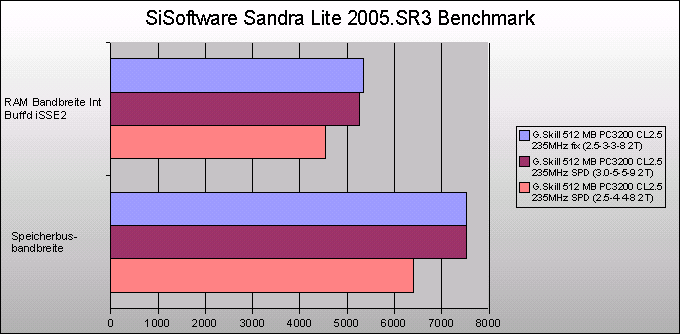
Let us begin with the maximum timings and the benchmark ratings on different frequencies. The test results are based on an EPoX 9NPA+ SLI nForce4 Motherboard with an Athlon 64 3000+ CPU running with a different frequency depending upon reference clock for the different memory benchmarks. Thus the multiplicator adjustment remains on 9x with all frequencies. An adjustment for the CPU in half steps would be too inaccurate to get nearly the same CPU frequency for all tests.
Microsoft Windows XP Professional SP2 is used as operating system. The stability was examined with the software Memtest86
and the SiSoft Sandra Lite 2005.SR3 program is used for all benchmarks, since it offers extensive adjustments and a fast result comparison.
First the maximum possible frequency of the memory modules was determined in dual channel mode. Therfor the memory frequency was increased in small steps with a fixed memory timing of 2.5-3-3-8 (2T) and default memory voltage, as long as the detailed memory test with Memtest86 runs without errors. This quite long testing time ensures that this frequency works really stable on these modules.
The highest possible frequency with 2.5-3-3-8 (Tcl Trcd Tras Trp) values was stable with 235 MHz.
For example, the Crucial Ballistix Tracer PC4000 modules reached with the same timings up to 265 MHz. With increased voltages or lower timings it’s possible to run clearly higher frequencies, because the frequency values and timings depends directly from each other.
This highest possible frequency was compared to two adjustments. On the one hand 235 MHz with SPD values (these are given by the manufacturer in the SPD IC) and on the other hand 200 MHz with SPD values. By the way, the “Memory Bus Range” is no benchmark value, but the value is quite simple to calculate by the frequency and is useful for the benchmark comparison.
Here’re the benchmark results:
| Frequency | Timing | RAM Range Int Buff’d iSSE2 | Memory Bus Range |
| 235 MHz | fix (2.5-3-3-8 2T) | 5341 MB/s | 7520 MB/s |
| 235 MHz | SPD (3.0-5-5-9 2T) | 5254 MB/s | 7520 MB/s |
| 200 MHz | SPD (2.5-4-4-8 2T) | 4533 MB/s | 6400 MB/s |
And here’s a diagram of the benchmark values:

The result is quite good for PC3200 memory modules. However, 235 MHz may be already insufficient to overclock processors with locked multiplier and it would be necessary to reduce the timings at the expense of performance to reach higher frequencies. To overclock newer AMD Socket A processors, AMD Athlon 64, or Intel CPUs with fixed multi (see workshop area) it’s recommendable to use faster memory modules. But without overclocking, the choice of PC3200 DDR modules is still resonable, because there’s nearly no noticeable difference compared to High-End PC4000 modules running with 200MHz (internal 400MHz) and SPD autodetection.

